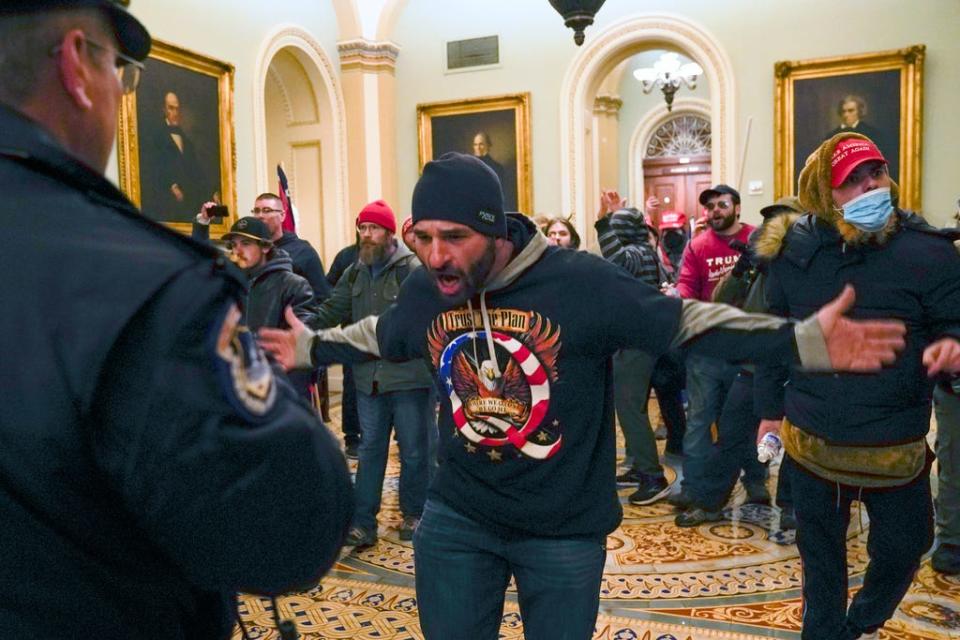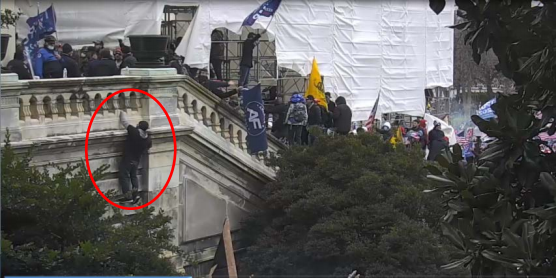Capitol riot suspect seeks to dismiss felony charge for 'obstructing, influencing or impeding' Congress
DES MOINES, Iowa — Iowa defendant Doug Jensen argued in a new motion filed Sunday that — despite the events of Jan. 6 forcing members of Congress to flee their chambers in the middle of a joint session to certify the results of the 2020 election — his storming of the Capitol did not amount to "obstructing an official proceeding" under federal criminal law.
The charge, one of seven Jensen faces for his role in the riots, carries a maximum penalty of 20 years in prison and has been brought against many of the most high-profile Jan. 6 defendants. Jensen is one of several defendants to challenge how prosecutors are using a 20-year-old witness tampering statute, and at least one federal judge has signaled concern that the law may be too vague to cover the events of the riot.
The statute in question is titled "tampering with a witness, victim or an informant" and was passed in the wake of the Enron scandal and other high-profile corporate crimes in the early 2000s. It applies to anyone who "alters, destroys, mutilates or conceals a record ... or otherwise obstructs, influences or impedes any official proceeding."

In his new filing, Jensen argues the law is clearly meant to apply to people who try to conceal evidence from a judicial proceeding, and cannot be read to govern demonstrations that disrupt a Congressional session.
To the extent that prosecutors do use it in the context of political demonstrations, the law is so vague as to be unconstitutional under the Fifth Amendment's guarantees of due process, he says.
"Nothing in (the statute) would have given fair notice to Mr. Jensen or to any person of common intelligence, that if he entered the United States Capitol for a short time, without injuring anyone or damaging any property while associated with others seeking to petition the Congress, his conduct would ... subject him to imprisonment for a term of 20 years," Jensen argues in his new filing.
Alison Guernsey, a professor and the director of the Federal Criminal Defense Clinic at the University of Iowa Law School, said Monday that Jensen faces "a very difficult hill to climb" in arguing the Jan. 6 joint session of Congress was not an official proceeding. But, she said, his due process argument — that the statute did not clearly prohibit the actions of Jan. 6 rioters — could be a strong one.
"The way the statute is actually structured … I think it’s quite difficult to be able to pinpoint precisely what conduct is going to violate that statute, given the combination of the terms 'corruptly' and 'otherwise'," Guernsey said.

The courts must consider both whether the wording of the law is too vague and whether it is overly broad, Guernsey said, noting the Supreme Court struck down a conviction in the 1990s under a similar statute over the vagueness of the term "corruptly." Jensen's motion also includes a list of past protests or demonstrations in the Capitol that have been met with much less serious charges.
"Is it so unclear what conduct the statute reaches that prosecutors are able to just cherry-pick in a way that’s standardless and therefore arbitrarily enforce the statute?" Guernsey asked.
Looking into President Trump's efforts: Jan. 6 committee issues subpoenas to 4 in Trump's inner circle
Jensen's new filing comes after a Washington district judge asked similar questions in August. Judge Randolph Moss told prosecutors in several similar cases they could face a "constitutional vagueness problem" if they could not clearly articulate what separates the Jan. 6 riot from other trespassing or disorderly conduct cases.
“Unless we can tell the public where that line is, there’s a problem,” Moss said, according to the Washington Post.
Moss ordered prosecutors and defense attorneys for Jan. 6 defendants Brady Knowlton and Patrick Montgomery to submit additional briefing but has not yet ruled on their motion to dismiss. Prosecutors have not yet filed a response to Jensen's new motion.
Jensen achieved notoriety during the riot after he was videotaped in a distinctive QAnon shirt chasing a police officer up a flight of stairs inside the Capitol. He was recently sent back to jail to await trial after he was caught by probation officials using a contraband cell phone to watch election conspiracy videos despite a judge's order that he stay offline.
Follow William Morris on Twitter: @DMRMorris.
This article originally appeared on Des Moines Register: Capitol riot suspect seeks dismissal of obstruction charge

 Yahoo Movies
Yahoo Movies 
